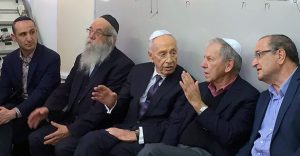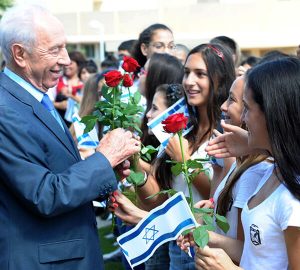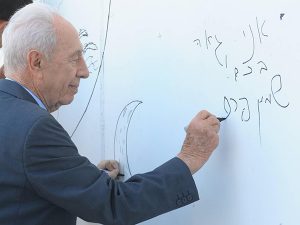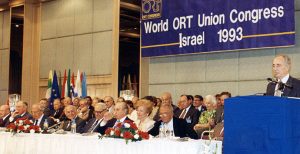Schools across Israel opened this morning by studying Shimon Peres’s contributions to the country. It was a fitting tribute to a statesman whose lifelong devotion to Israel included a keen awareness of the central importance of education.
“He saw education as no less important than security in ensuring the future of the Jewish People and the State of Israel,” said World ORT Director General and CEO Shmuel Sisso. “He was dedicated to education.”

Shimon Peres at the March 2016 launch of the Derech project giving educational opportunities to Chareidi youth. With him are World ORT Chief Operating Officer Dan Green (left), philanthropist Nathan Kirsh (second right) and World ORT Director General and CEO Shmuel Sisso (right).
That dedication brought him to Bnei Brak in March where he joined philanthropist Nathan Kirsh for the inauguration of a World ORT project, in partnership with The Kirsh Foundation, providing computer labs and ICT suites for Charedi youth.
It was the last of many occasions at which Peres and Mr Sisso spent time together.
“I had the pleasure of meeting him many times while Consul-General of New York and as Mayor of Kiryat Yam,” Mr Sisso said. “He was a very wise man. You never left him without the impression that he had given you a profound insight. And he never let party politics get in the way of whatever needed to be done. His passing is a great loss for us all.”
The importance Peres placed on education meant that he recognised ORT’s significance. In 1986, as Prime Minister, he told the World ORT Congress:
“I truly believe that ORT is one of the most important organisations in Jewish life… and I believe also that ORT has made the most valuable contribution to our young generation by its operations in challenging, demanding and far-away places, where it has taken science and technology to what it recognises to be the generations of hope for Jewish life and for the State of Israel.”
Foreign Minister Shimon Peres addresses the World ORT Union Congress in 1993.
He went on: “Not only what you do in Israel but what you do abroad in Jewish life is of great importance because we are facing two major problems: not enough Jewish people are coming to Israel and, alas, too many Jewish people are leaving Judaism. For these two reasons we have to emphasise education – both scientific and Jewish – as a major challenge for the future.”
In 1993, this time as Foreign Minister, Peres again addressed the World ORT Congress. ORT was “deep and serious in our life”, he said, before noting that there were two kinds of countries in the Middle East, the holy and the oily – and that Israel clearly did not belong in the latter category.
“We took a country that was a desert from every possible point of view, so the only way to overcome the desert was really by education, by science, by technology, by human motivation, human pioneering,” he said.
Twenty-two years later, Peres reiterated the importance he placed on technology education when he met students from World ORT-affiliated schools in Kiryat Yam who had come to Beit HaNassi to watch the launch of Israel’s Amos 3 satellite.
“He talked about how important technology is in our society and said he hoped that we would study it and work in Israel’s high-tech sector,” said one of those students, Din Maransev.

Shimon Peres arrives at the 2012 opening of World ORT-affiliated Sha’ar HaNegev High School’s new rocket-proof campus.
In August 2012, the inter-relationship between security and education became clear with Peres’s participation in the opening of the new rocket-proof campus at World ORT-affiliated Sha’ar HaNegev High School.
The new campus meant the end of 12 years of students and teachers sprinting into shelters whenever a ‘red alert’ warned of incoming missiles from Gaza, just a couple of miles away. Now they could continue their lessons without fear.
Peres, who was now President, joined the 1,200 students at the campus which had been built next to the old one in a defiant message to the terrorists who had been trying to render their home uninhabitable.

“I am proud of you.” Shimon Peres writes a tribute to Sha’ar HaNegev students at the 2012 opening of the World ORT-affiliated school’s new rocket-proof campus.
“I’m proud of you,” the President wrote on a special message board, saying later that the students had displayed “steadfastness in learning, achievements and creativity”.
“This fortified school inaugurated today is the least that can be done for you. In response to the rockets you are making a strong statement,” he added.
To the world, Peres may be best known as a Nobel Peace laureate and his work for peace and mutual understanding featured in his major addresses to World ORT congresses. But it was a task which he saw as extending beyond the realm of diplomacy and into civil society; it was part and parcel of a general desire for social and economic development.
“The world has changed,” he concluded in his 1993 address to the World ORT Congress. “There is so little to do with missiles and planes and so much to do with schools and education. We also have to get rid of old prejudices and not to take all the disputes as a permanent presence of an ongoing future. Alas, people prefer to remember rather than to think. It is not a time of remembrance. It is a time of thinking. It is because of it that we attach so much importance to your organisation.
“We cannot change the Land of Israel, the size of it, so we are changing the population with an immigration from Russia, with our own rate of birth, with an immigration from other places. We cannot enrich the land with gold and silver and oil. We can have enriched people enriching the land. We don’t want to be just a fighting nation; we want to be a winning nation, to offer to neighbours, close and far away, a new hope and a new example, to tell them that even a desert is not a must, you can cross it once in 40 years and then in another 40 years make out of it a garden.
“It is here where the most important promise and the major call of our time resides, and let’s do a job which fits the need of our time and that promises a future for our children.”






